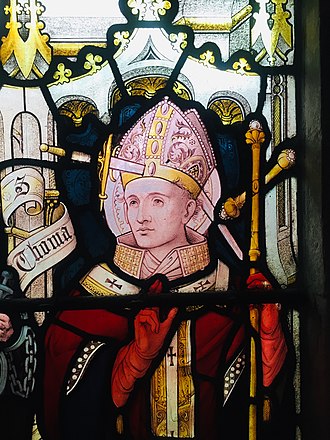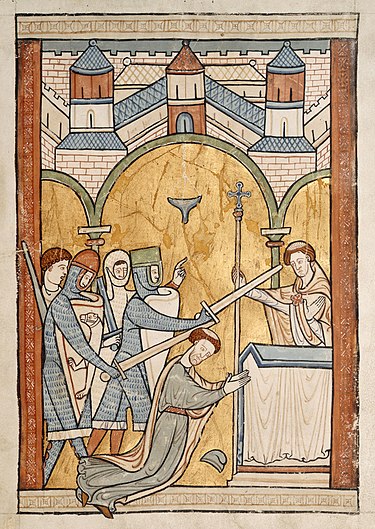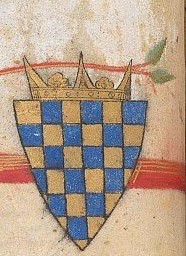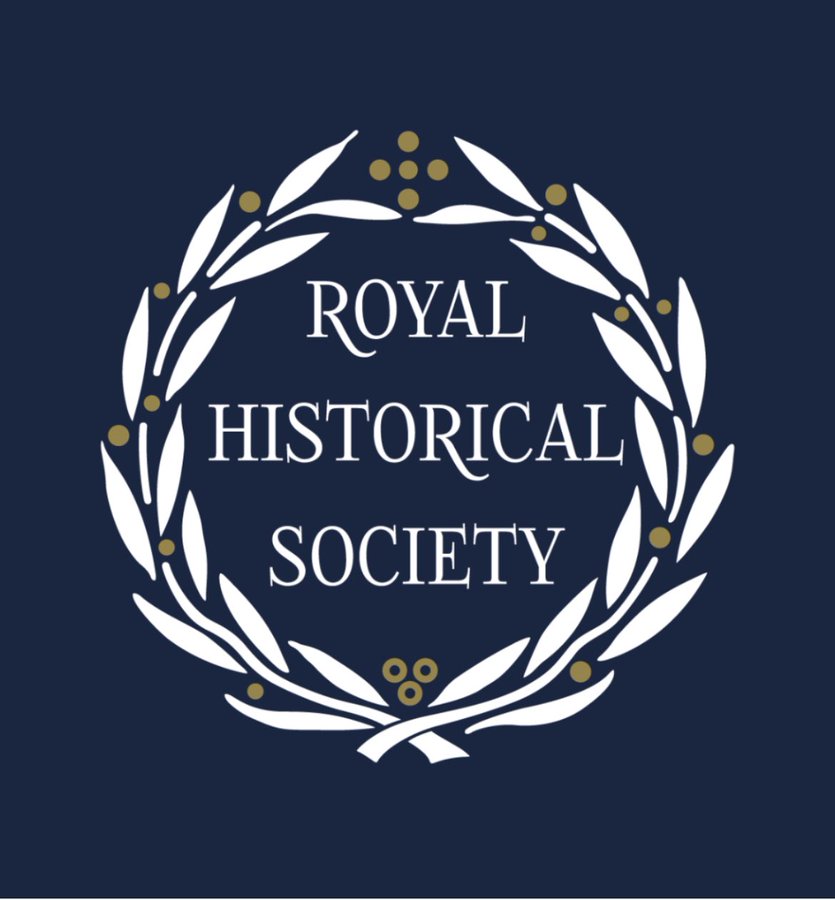You may have heard of the murder of Thomas Becket, but did you know one of the four knights involved may have had a more personal motive for attacking the controversial archbishop of Canterbury than his colleagues? Richard Brito had been a knight in the household of Henry II’s youngest brother, William of Anjou, also known as William FitzEmpress. He was also William’s friend. William was the youngest son of Empress Matilda and her husband Geoffrey, Count of Anjou. Empress Matilda had been one of the rival claimants for the English throne during the Anarchy, fighting against her cousin, King Stephen.
King Stephen’s youngest son, William of Blois, had been married to the great heiress, Isabel de Warenne, Countess of Warenne and Surrey in her own right. His death while returning from campaigning in Toulouse in 1159, left Isabel a wealthy young widow, and highly desirable marriage prize.
Though recently widowed, Isabel would have been well aware that she was expected to remarry, just as her mother had done. The fact she held the mighty earldom of Surrey would have made settling her future even more pressing; the earl of Warenne had contributed knights and men from his own lands to the armies of both King Stephen and Henry II. This was expected to continue, but Isabel could not be expected to lead men into battle. It is all the more surprising, therefore, that Isabel was allowed some respite in the marriage market and the prospect of a husband is not mentioned until 1162.
By this time Henry II’s youngest brother, William FitzEmpress, was seeking a dispensation to marry her. The dispensation was refused by Thomas Becket, Archbishop of Canterbury, on the grounds of consanguinity. The objection was not due to a blood relationship between Isabel and William, but between William and Isabel’s first husband, William of Blois, who were second cousins. It has often been suggested that this was a love-match rather than an arranged marriage. We will, of course, never know how Isabel felt but William died shortly afterwards, at Rouen on 30 January 1164, whilst visiting his mother, possibly seeking her assistance in the matter. Many of his friends claimed that he died of a broken heart after being disappointed in his desire to marry Isabel. He was 27.
The relationship between Henry II and Thomas Becket had been rocky ever since Becket became archbishop of Canterbury. Henry had thought that putting his friend in charge of the church in England would mean the two would be able to work together. However, once in the post, Becket had essentially abandoned Henry’s policies and sought to defend and extend the influence and rights of the church in England, while Henry sought to curb them. A clash was inevitable and came about when Henry sought to extend the jurisdiction of secular courts over English clergymen and to protect the traditional rights of royal government in regard to the church. In January 1164 Henry had issued the Constitutions of Clarendon. The sixteen constitutions were intended to curb clerical independence and weaken the connection of the English church with Rome. Becket consented to the Constitutions, but disputes continued throughout 1164. Henry called for the archbishop to appear at a great council at Northampton Castle on 12 October 1164, to answer to the charges laid against him.
Among numerous other issues, Becket was called to account for his behaviour concerning land disputes between the church and crown, contempt of royal authority and malfeasance in the chancellor’s office. The bishops, earls and barons of the realm were all present, including Roger, archbishop of York, the most senior clergyman in England after the archbishop of Canterbury. Henry II’s brother, Hamelin, was at the trial and spoke in support of Henry. Indeed, Hamelin, the new earl of Warenne and Surrey, and the archbishop appear to have started a war of words; Hamelin defended Henry’s dignity and called Becket a traitor. Ironically, it is thought that Hamelin’s denunciation of Becket was motivated by the injury caused to the royal family in Becket’s refusal to allow King Henry’s brother, William, to marry Isabel de Warenne; who was now Hamelin’s wife. Convicted of the charges against him, Becket stormed out and fled to exile in France, where he received protection from Louis VII.
There followed six years of negotiations, accusations and counter-accusations, before an accord was agreed and Becket was finally able to return to England and his see at Canterbury. Henry II wrote to his son Henry, the Young King, saying:
Henry king of England to his son Henry, king of England, greeting.
May you know that Thomas archbishop of Canterbury has made peace with me in accordance with my wishes. Therefore I order that he and his followers may have peace and that you see to it that he and his followers, who on his behalf left England, should have their possessions in peace and with honour, as they did three months before they left England. Summon before you some of the best and oldest knights of the honour of Saltwood and on their oath you should make an inquiry as to what of the fief of the archbishopric of Canterbury is there, and make sure that the archbishop gets what has been recognised as part of his fief. Witness Archbishop Rotrou of Rouen, at Chinon.
The Plantagenet Chronicles, edited by Elizabeth Hallam
After six years of exile, Thomas Becket arrived at Sandwich, on the Kent coast, on 1 December 1170. Shortly before arriving on England’s shores, however, in November 1170 Becket, rather than being conciliatory, had sent representatives ahead to pronounce the excommunication of those clerics (the archbishop of York and the bishops of London and Salisbury) who had been involved in the coronation of Henry II’s son and heir, Henry the Young King, in June 1170. He then proceeded to impose his discipline on his monks, refusing to ordain all but one of those who had been admitted during his six-year absence.
On hearing of the excommunications, during his Christmas court in Normandy, Henry is said to have pronounced the fateful words:
‘What miserable drones and traitors have I nurtured and promoted in my household who let their lord be treated with such shameful contempt by a low-born clerk!’
Franck Barlow, Oxforddnb.com
Four knights heeded Henry’s words and left Normandy to confront the archbishop. One of William FitzEmpress’s former knights, Richard Brito, was among the quartet who murdered Thomas Becket on 29 December 1170. The knights had travelled from Normandy to demand that the archbishop restore the English bishops who had been suspended from their offices, and to absolve those under sentence of excommunication. Becket refused, saying that it was not
‘for a lesser judge to dissolve the sentence of a superior, and that it was not for any man to undermine what had been decreed by the apostolic see.’
The Plantagenet Chronicles, edited by Elizabeth Hallam
According to William FitzStephen the knights attempted to arrest the archbishop and a struggle ensued after he refused to go with them. The archbishop’s companion, Master Edward Grim, stepped into the path of the first stroke meant for Becket. The archbishop then gave thanks to God, saying
‘Into thy hands, O Lord, I commend my spirit.’ As he knelt down, clasping and stretching out his hands to God, a second stroke was dealt him on the head, at which he fell flat on his face hard by an altar there dedicated to St Benedict … On the right hand he fell, as one proceeding to the right hand of God. While he lay there stricken, Richard Brito smote him with such force that the sword was broken against his head, and the pavement of the church: ‘Take that,’ said he, ‘for the love of my lord William, the king’s brother.’
The Plantagenet Chronicles, edited by Elizabeth Hallam
Beyond this extreme reaction by William’s knight, Richard Brito, there is little evidence that the proposed marriage between William and Isabel was a true love match, and we have no indication of Isabel’s thoughts on the matter. Even without the love angle, for William, marrying Isabel would have been an attractive prospect and would have given him position and power in England, not only as the king’s brother but also as one of the foremost magnates in England and Normandy.
For King Henry, the proposed marriage would have been a very practical match. It would have been the perfect solution to the dilemma of what to do with Isabel and the vast Warenne holdings in England and Normandy; to bring them into the royal family and to have them held by the king’s own brother. Henry II was not to be so easily thwarted, however, and indeed did not object to Thomas Becket’s ruling against the marriage of William FitzEmpress and Isabel de Warenne. He came up with a solution that would achieve the same end, while satisfying the restrictions of the church: his brother Hamelin.
In the aftermath of the murder, Richard Brito and his three accomplices
plundered the property of the archbishop, the clothes of the clergy and servants, and even the utensils from the workshop. They swiftly made off with all the which they found in his stables, as spoils.
The Plantagenet Chronicles, edited by Elizabeth Hallam
Brito and the three other knights, Riginald Fitzurse, Sir William Traci and Hugh de Morville fled to Scotland and then to Knaresborough Castle in Yorkshire, owned by Morville. All four were excommunicated by Pope Alexander III at Easter 1171. They were each ordered to make a 14-year pilgrimage to the Holy Land in penitence. Once their penitential duties in the Holy Land were fulfilled, they were to visit the holy places barefoot and in hair shirts and then to live alone for the rest of their lives on the Black Mountain near Antioch and spend their time in vigil, prayer, and lamentation. It is believed that none of the four knights returned from the Holy Land, though one legend has Brito, also known as Richard le Breton, eventually retiring to the island of Jersey. Nothing more is known of his eventual fate.
Thomas Becket, Archbishop of Canterbury, was canonised on Ash Wednesday, 21 February 1173.
*
Images:
Courtesy of Wikipedia except seal of Isabel de Warenne which is ©Sharon Bennett Connolly.
Sources:
Robert Batlett, England Under the Norman and Angevin Kings; Elizabeth Hallam, editor, The Plantagenet Chronicles; Dan Jones, The Plantagenets; Donald Matthew, King Stephen; Medieval Lands Project on the Earls of Surrey, Conisbrough Castle; Farrer, William and Charles Travis Clay, editors, Early Yorkshire Charters, Volume 8: The Honour of Warenne; Rev. John Watson, Memoirs of the Ancient Earls of Warren and Surrey and their Descendants to the Present Time; Morris, Marc King John: Treachery, Tyranny and the Road to Magna Carta; Church, Stephen, King John: England, Magna Carta and the Making of a Tyrant; doncasterhistory.co.uk; Oxforddnb.com.
*
My books:
Signed, dedicated copies of all my books are available through my online bookshop.
Coming 15 January 2024: Women of the Anarchy
On the one side is Empress Matilda, or Maud. The sole surviving legitimate child of Henry I, she is fighting for her birthright and that of her children. On the other side is her cousin, Queen Matilda, supporting her husband, King Stephen, and fighting to see her own son inherit the English crown. Both women are granddaughters of St Margaret, Queen of Scotland and descendants of Alfred the Great of Wessex. Women of the Anarchy demonstrates how these women, unable to wield a sword, were prime movers in this time of conflict and lawlessness. It show how their strengths, weaknesses, and personal ambitions swung the fortunes of war one way – and then the other.
Available for pre-order from Amberley Publishing and Amazon UK.
Coming on 15 June 2024: Heroines of the Tudor World
Heroines of the Tudor World tells the stories of the most remarkable women from European history in the time of the Tudor dynasty, 1485-1603. These are the women who ruled, the women who founded dynasties, the women who fought for religious freedom, their families and love. These are the women who made a difference, who influenced countries, kings and the Reformation. In the era dominated by the Renaissance and Reformation, Heroines of the Tudor World examines the threats and challenges faced by the women of the era, and how they overcame them. Some famous, some infamous, some less well known, including Anne Boleyn, Elizabeth Barton, Catherine de Medici, Bess of Hardwick and Elizabeth I. From writers to regents, from nuns to queens, Heroines of the Tudor World shines the spotlight on the women helped to shape Early Modern Europe.
Heroines of the Tudor World is now available for pre-order from Amberley Publishing and Amazon UK.
Also by Sharon Bennett Connolly:
King John’s Right-Hand Lady: The Story of Nicholaa de la Haye is the story of a truly remarkable lady. Nicholaa de la Haye was the hereditary constable of Lincoln Castle and the first woman in England to be appointed sheriff in her own right. Her strength and tenacity saved England at one of the lowest points in its history. Nicholaa de la Haye is one woman in English history whose story needs to be told… King John’s Right-Hand Lady: The Story of Nicholaa de la Haye is now available from Pen & Sword Books, bookshop.org and Amazon.
Defenders of the Norman Crown: The Rise and Fall of the Warenne Earls of Surrey tells the fascinating story of the Warenne dynasty, of the successes and failures of one of the most powerful families in England, from its origins in Normandy, through the Conquest, Magna Carta, the wars and marriages that led to its ultimate demise in the reign of Edward III. Defenders of the Norman Crown: Rise and Fall of the Warenne Earls of Surrey is now available from Pen & Sword Books, Amazon in the UK and US, and Bookshop.org.
Ladies of Magna Carta: Women of Influence in Thirteenth Century England looks into the relationships of the various noble families of the 13th century, and how they were affected by the Barons’ Wars, Magna Carta and its aftermath; the bonds that were formed and those that were broken. It is now available in paperback and hardback from Pen & Sword, Amazon, and Bookshop.org.
Heroines of the Medieval World tells the stories of some of the most remarkable women from Medieval history, from Eleanor of Aquitaine to Julian of Norwich. Available now from Amberley Publishing and Amazon, and Bookshop.org.
Silk and the Sword: The Women of the Norman Conquest traces the fortunes of the women who had a significant role to play in the momentous events of 1066. Available now from Amazon, Amberley Publishing, and Bookshop.org.
Alternate Endings: An anthology of historical fiction short stories including Long Live the King… which is my take what might have happened had King John not died in October 1216. Available in paperback and kindle from Amazon.
Podcast:
Have a listen to the A Slice of Medieval podcast, which I co-host with Historical fiction novelist Derek Birks. Derek and I welcome guests, such as Bernard Cornwell and Elizabeth Chadwick, and discuss a wide range of topics in medieval history, from significant events to the personalities involved.
*
Don’t forget! Signed and dedicated copies of all my books are available through my online bookshop.
For forthcoming online and in-person talks, please check out my Events Page.
You can be the first to read new articles by clicking the ‘Follow’ button, liking our Facebook page or joining me on Twitter and Instagram.
©2020 Sharon Bennett Connolly FRHistS









Dear Sharon
Another fascinating post, thank you!
Just one point: by Slatwood do you mean Saltwood? The word comes in “the honour of Slatwood” starting with The King of England to his son Henry, King of England
LikeLiked by 1 person
Yes, it should be Saltwood. Thank you Sylvia, I will edit that. 😀
LikeLiked by 1 person
Sorry, Sharon! Me and my eagle eyes!!!
S xxx
LikeLike
Don’t worry about it. The article is adapted from a passage in my next book, which I’m currently editing. And i missed that spelling error! So, thank you! 😃
LikeLike
The stories I’ve read say that Henry II, on learning of the returned Beckett’s actions, said “Who will rid me of this troublesome priest?”.
Nor have I read of a discussion preceding the murder, although I have read that someone sought to head off the first blows.
LikeLike
There are so many versions! The sources i have used were actually eye witnesses to the murder – Becket’s own people, in the cathedral with him at the time. Even the ‘troublesome priest’ quote has many variants (troublesome, meddlesome, turbulent have all quoted), although the quite is now considered to be highly inaccurate. The one in the article, taken from the Oxford Dictionary of National Biography, in which Henry refers to Becket as a ‘low born cleric’ is now thought to be more accurate version. There is a wealth of information out there! For the quotes, I used the Plantagenet Chronicles, edited by Elizabeth Hallam, as she brings all the different chroniclers together, including John of Salisbury (Becket’s Secretary), Ralph of Diceto and Edward Grim.
LikeLike
Sharon, thank you for a very interesting article.
So Thomas accumulated enemies right and left, with as much enthusiasm as when he pursed women and drink in his youth 😉
LikeLiked by 1 person
Yes, apparently so! I’m so glad you found the article interesting – I loved being able to put a different, personal angle on the story. 😀
LikeLike
Was Richard Brito related to Ralph Brito, the Justiciar, died 1186? Many thanks. Fiona
LikeLike
I am afraid I don’t know, Fiona. I haven’t come across Ralph Brito before. While it is possible, I don’t know how likely. Brito wasn’t Richard’s surname, but more like a nickname – shortened from Richard le Breton. I keep a note of these kind of questions, and if I come across anything, i will let you know. Sharon 😀
LikeLike
That’s really kind. Thank you. Fiona
LikeLiked by 1 person